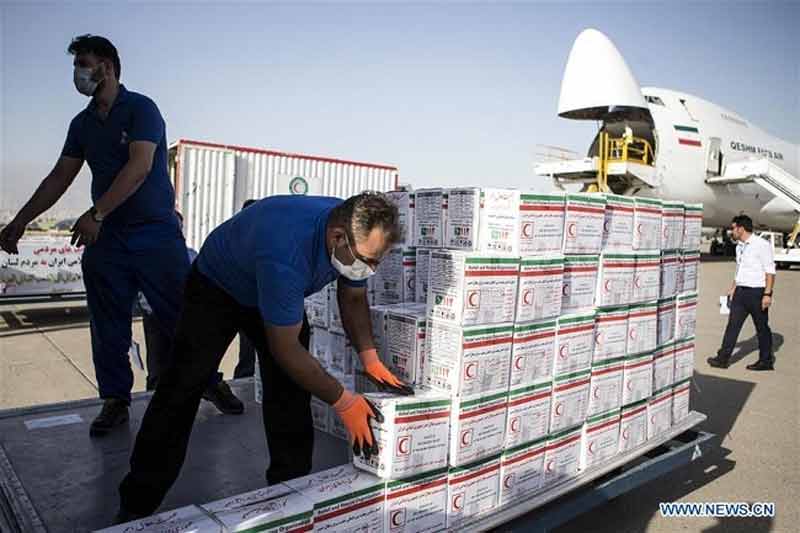



Workers prepare to load boxes of food and medical supplies to an airplane at Mehrabad International Airport in Tehran, Iran, on Aug. 5, 2020. (Photo: Xinhua)
Two huge explosions rocked Port of Beirut on Tuesday (August 4) at around 6:10 p.m. local time (1610 GMT), leaving 137 people dead and 5,000 others injured on Wednesday (August 5).
CATASTROPHIC DAMAGE
According to local media, Beirut Governor Marwan Abboud estimated on Wednesday that the explosions cost the city US$3 billion to US$5 billion in property losses, worsening the city and the country's suffering amid a government reshuffle and COVID-19 pandemic.
Most of the shops in Beirut's downtown area, which is located near the port, were destroyed. Buildings in other locations in the city were partly if not fully destroyed.
Furthermore, according to President of the Syndicate of Hotels Owners Pierre Ashkar, 90 percent of the hotels in the city were damaged while many of the employees and guests injured.
The number of deaths is expected to climb as search and rescue efforts goes on. What led to the blasts is yet to be determined as investigations are ongoing. Primary information reveals that ammonium nitrate stored in a warehouse at the port since 2014 is a possible cause.
Besides civilian casualties, over 100 UN staff are also injured in the explosions, including 22 members of the UN Interim Force in Lebanon (UNIFIL) who were in the port when the blasts occurred.
"We expect that the damage of the port will significantly exacerbate the economic and food security situation in Lebanon, which imports about 80 percent to 85 percent of its food," said Farhan Haq, deputy spokesman for UN Secretary-General Antonio Guterres.
"This is a place that's used both for goods for Lebanon but also for some of our activities in Syria," he said.
Many countries and international organizations, including the UN, the Arab League and the European Union (EU), have expressed sorrow for and condolences to Lebanon over the deadly blasts.
"Our heartfelt condolences go to the families who have lost their dear ones. Our thoughts are with those who are hurt and injured," UN High Commissioner for Refugees Filippo Grandi said in a statement on Wednesday.
INTERNATIONAL AID
The disaster in Beirut has attracted worldwide sympathy and support as international aid is flowing to Lebanon from the international community.
The World Health Organization is working with the Lebanese Health Ministry to assess hospital facilities in Beirut, their functionality and needs for additional support, particularly amid the COVID-19 pandemic.
Upon the request of the UNIFIL, the 18th batch of Chinese peacekeeping troops to Lebanon has organized an emergency team of nine medical personnel carrying medical supplies and protective equipment, heading to the capital city.
Its neighbors in the Middle East have taken swift response on Wednesday.
Iran's Red Crescent Society announced the shipment of 2,000 packages of food, weighing nine tons, to Lebanon, together with medicines, medical equipment and professionals. They will help to create a hospital in Beirut.
King Abdullah II of Jordan instructed that a military field hospital be sent to Lebanon as a rescue unit, which will be dispatched on Thursday.
Egyptian President Abdel-Fattah al-Sisi and Tunisian President Kais Saied respectively ordered food aid and medical supplies be flown to Beirut. Meanwhile, supplies from Qatar and Kuwait also poured in.
Across the Mediterranean Sea, the EU has activated Civil Protection Mechanism, coordinating the urgent deployment of over a 100 firefighters, with vehicles, dogs and equipment, to help Lebanese authorities save lives on the ground.
According to EU Commissioner for Crisis Management Janez Lenarcic, the mechanism will have participants like Germany, France, Poland, the Netherlands, Greece and the Czech Republic.
On Wednesday, German Chancellor Angela Merkel promised Germany's help to Lebanon while French President Emmanuel Macron decided to go to Beirut on Thursday (August 6) after promising to dispatch a civil security detachment, emergency doctors and several tons of medical equipment.
After five Russian aircraft were reportedly sent to help Lebanon remove rubble resulting from the explosions, Russia said Wednesday that the country will send a group of equipped rescuers to the Lebanese capital, together with an airmobile hospital and a mobile lab.
* Meanwhile, US Secretary of State Mike Pompeo in a call with Lebanese Prime Minister Hassan Diab on Wednesday reiterated 'steadfast' commitment to assist the Lebanese people, the State Department said on Wednesday, after a massive warehouse blast killed 135 people and injured thousands.
* Lebanon mourned on Thursday the victims of the most powerful blast to hit the country that was already being crushed by an economic crisis, as rescuers searched for those missing since the explosion that flattened Beirut port and devastated the city.
French President Emmanuel Macron, making the first visit by a foreign leader since Tuesday's blast which killed at least 137 people and injured 5,000, was due to arrive in Beirut later on Thursday along with specialist rescue personnel and equipment.
Dozens are missing and up to a quarter of a million people were left without homes fit to live in after shockwaves smashed building facades, sucked furniture out into streets and shattered windows miles inland.
Officials expect the death toll to rise.
Prime Minister Hassan Diab declared three days of mourning from Thursday for victims of the explosion, the most devastating ever to hit the city that is still scarred by civil war three decades ago and reeling from a financial meltdown and surge in coronavirus cases.
President Michel Aoun said 2,750 tonnes of ammonium nitrate, used in fertilisers and bombs, had been stored for six years at the port after it was seized. He promised a thorough investigation and to hold those responsible to account.